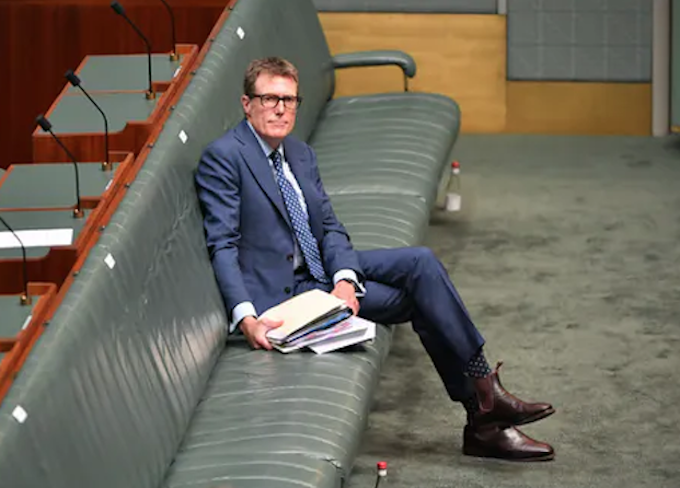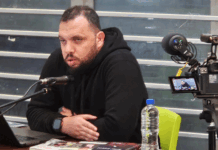
By Rodney Tiffen, University of Sydney
“Not a great week for journalism at the ABC”, News Corp’s Sharri Markson tweeted earlier this month, when the week was barely a day old.
It is hard to remember the last time a News Corp columnist declared it was a great week for journalism at the ABC. Markson’s tweet linked to a story in The Australian that quoted former Attorney-General Christian Porter saying his dropping of his defamation claim against the ABC was “a humiliating backdown by the ABC”.
Apart from reporting the settlement, the main basis for the article was that the ABC had warned its staff not to claim victory following Porter’s withdrawal, and to be careful in the way they talked about it.
- READ MORE: View from The Hill: Porter decides it’s time to ‘fold em’ in ABC defamation case
- Latest $84 million cuts rip the heart out of the ABC, and our democracy
- Conspiracy theories on the right, cancel culture on the left: how political legitimacy came under threat in 2020
At such a legally sensitive moment, one might have thought the ABC warning to staff was mere prudence, but it also points to more recurring issues about how media organisations view their journalists’ statements on social media. These issues are likely to become more common, not less.
The right to tweet?
The Sydney Morning Herald recently published a story quoting Liberal Senator and former ABC journalist Sarah Henderson saying the national broadcaster’s social media policy was “woefully inadequate”.
There are genuine dilemmas here. Journalists as professionals and employees are subject to certain disciplines. What they tweet can and will affect the way others perceive their work.
Conversely, as citizens, they also have the right to free expression.
In April, The Australian’s economics editor, Adam Creighton, sent this tweet:
Covid19 has killed free speech. Covid19 will be the most formative event of my life.
Virtue signalling dominates truth.
The West is finished.— Adam Creighton (@Adam_Creighton) April 11, 2021
Does such a cri de coeur affect how readers regard his judgement and capacity to report? Or should he have the right to say how he feels?
What constitutes crossing the line?
The ABC is the Australian media organisation that has most earnestly sought to resolve these dilemmas. It has four eminently sensible guidelines:
- do not mix the professional and the personal in ways likely to bring the ABC into disrepute
- do not undermine your effectiveness at work
- do not imply ABC endorsement of your personal views
- do not disclose confidential information obtained through work.
Henderson pointed to two breaches of these guidelines. One was from an ABC lawyer who called the Coalition government “fascist” and Prime Minister Scott Morrison “an awful human being” on Twitter, and then resigned. Henderson said he should not have been allowed to resign, but should have been fired.
Her other example involved what she called “Laura Tingle’s trolling of a prime minister” last year. This is an inaccurate use of the word trolling, but increasingly politicians (and journalists) seem to equate any criticism of themselves on social media as trolling.
Tingle’s single offending tweet concluded “we grieve the loss of so many of our fine colleagues to government ideological bastardry. Hope you are feeling smug Scott Morrison”. The tweet was posted late at night after a farewell function for her friend and colleague Philippa McDonald, and it was deleted the next morning.
It is asking a lot of ABC journalists to feel detached and impartial about government cutbacks to their own organisation that adversely affect the careers of their colleagues. Nevertheless, the ABC has a large investment in Tingle’s public credibility, and the tweet was immediately addressed internally.
ABC managing director David Anderson injected an unusual note of common sense when he was asked whether Tingle was reprimanded during a Senate estimates hearing. He called Tingle’s tweet “an error of judgement” and said “there’s a proportionality that needs to be applied”.
ABC boss David Anderson says rural and regional jobs have been ring fenced from the current cuts. As of last week about 70 ABC staff whose roles are gone are yet to depart the public broadcaster. Everyone leaving knows their job is gone. #estimates
— Tom McIlroy (@TomMcIlroy) October 21, 2020
The dangers of an unduly restrictive approach
The larger danger is that journalists, especially those at the ABC, will get caught up in public controversies surrounding their own work. While at one level they clearly should have the right to defend themselves, the problem is the temptation to succumb to the cheap point-scoring in which critics often engage, to be dragged down from the professional standards of the original programme.
Though recent public controversies have focused on apparent breaches on social media not being sufficiently punished, there are also dangers and potential injustices in an unduly restrictive approach.
The most obvious victim of a journalist being punished for social media activity was SBS football commentator Scott McIntyre, who posted a series of tweets on ANZAC Day in 2015 about the “cultification of an imperialist invasion”.
Then-Communications Minister Malcolm Turnbull thought they were “despicable remarks which deserve to be condemned”, and contacted the head of SBS, Michael Ebeid. Ebeid fired McIntyre the same day.
Malcolm Turnbull denies influence over SBS decision to sack Scott McIntyre over controversial Anzac tweets. http://t.co/tzxHMBkCrD
— The Sydney Morning Herald (@smh) April 27, 2015
Human Rights Commissioner Tim Wilson was then quoted as saying McIntyre’s freedom of speech was not being curtailed, and that his historical claims “will be judged very harshly”.
Whatever the merits of his ANZAC tweets, they had no relationship to his role as a football commentator. Is his reporting on soccer compromised by his views on the ANZAC tradition?
This episode illustrates that “political correctness” and “cancel culture” are found across the political spectrum — and media organisations will continue to grapple with these issues as the social media profiles of their journalists continue to grow.![]()
Dr Rodney Tiffen, is emeritus professor in the Department of Government and International Relations, University of Sydney. This article is republished from The Conversation under a Creative Commons licence. Read the original article.










































